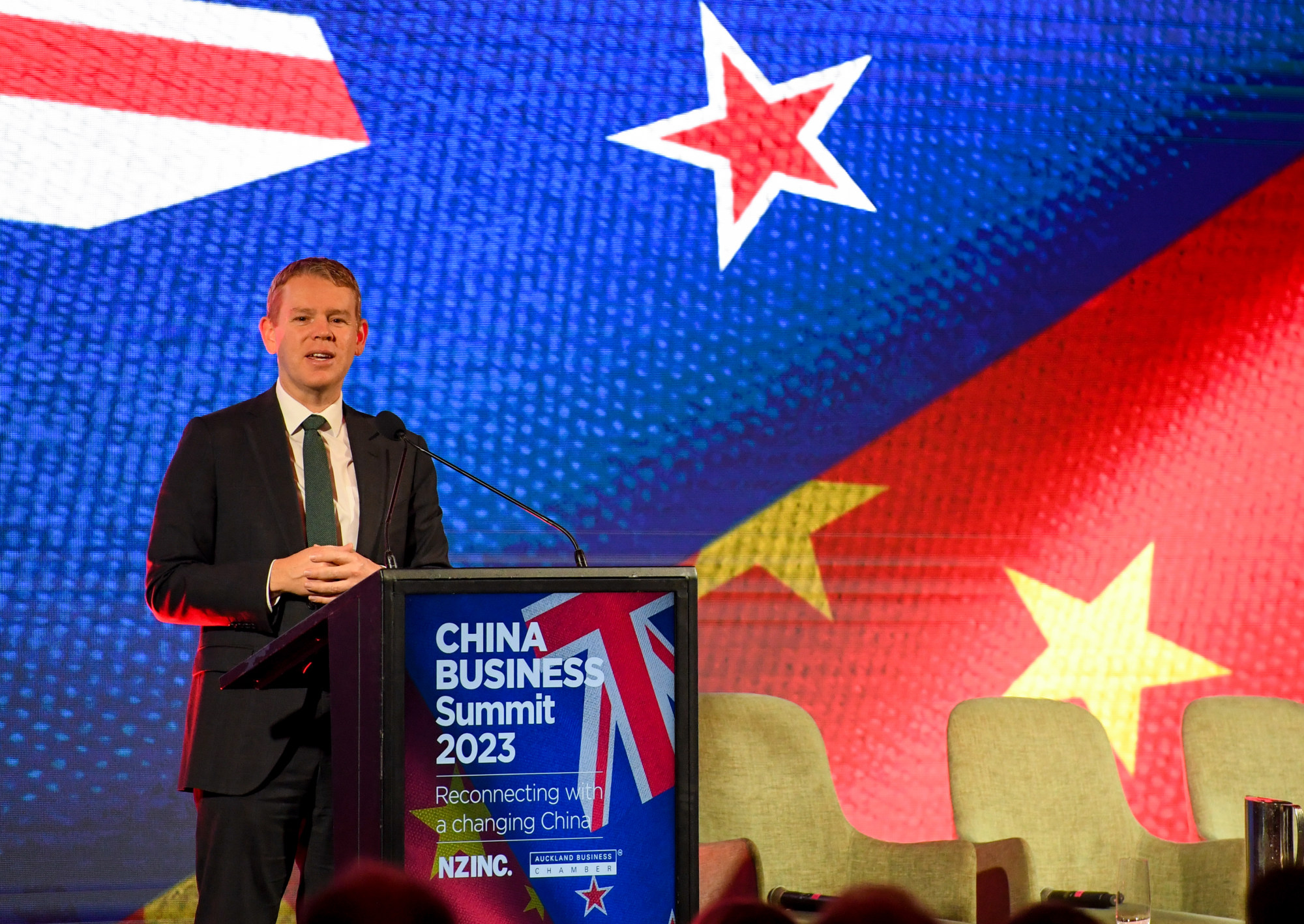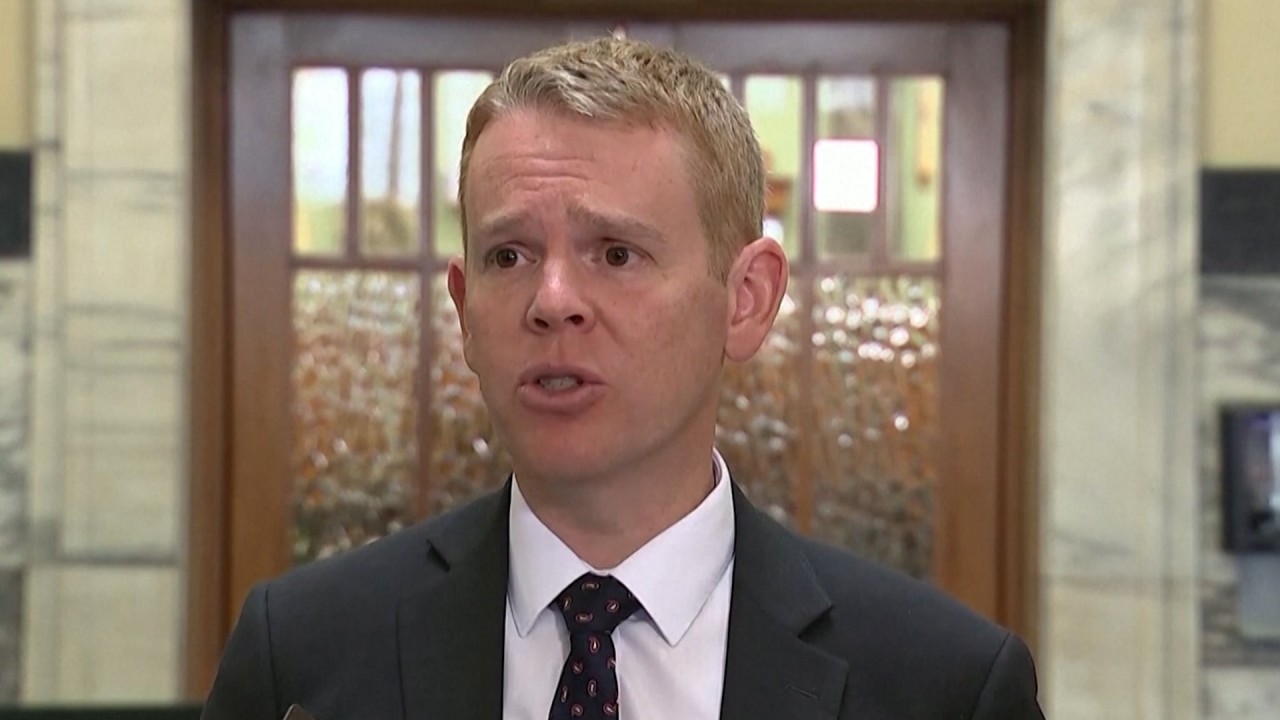
New Zealand-China relations: Wellington’s ‘weakest link’ image in focus as Western allies pursue hawkish line on Beijing
- New Zealand’s policy of strategic hedging is becoming harder to achieve as China grows more assertive in the Pacific region
- Wellington continues to have ‘robust exchanges’ with Beijing, analysts said – but has also come under fire for opening the door to the Nato ‘devil’

Speaking at the China Business Summit in Auckland on Monday, Hipkins said Beijing’s bid to exert influence was a major driver of increasing strategic competition, particularly in the Indo-Pacific region.
Geoffrey Miller, a geopolitical analyst at the Victoria University of Wellington’s Democracy Project focusing on New Zealand’s foreign policy, said the country’s balanced approach towards Beijing was now under threat as its Western partners pressured it to be more hawkish.
Hipkins’ attendance at this month’s Nato summit was “clearly a long-term proposition and far from just a one-off move to show solidarity with Ukraine”, Miller said, noting that New Zealand had recently released an assessment describing the future as “grim” and calling out what it said was China’s “assertive” foreign policy.
Is anti-nuclear New Zealand ‘playing with fire’ as it mulls role in Aukus?
“[This] was clearly aimed at China, although it did not mention Beijing by name,” Miller said.
Nicholas Ross Smith, a senior research fellow at the University of Canterbury’s National Centre for Research on Europe with a focus on great-power competition, said New Zealand had found itself in a challenging position where strategic hedging was becoming much harder to achieve.
“Reliability seems a big concern in the West at the moment, with New Zealand getting a reputation for being the weakest link not only in the Nato AP4 but in Five Eyes, too,” Smith said, referring to the transatlantic security alliance’s four “Asia-Pacific partners” and the Five Eyes international intelligence alliance, which also includes Australia, Britain, Canada, and the United States.
Critics fear the move will “entrench Chinese strategic interests in the Pacific islands at the expense of New Zealand”, Lanteigne said, adding that Beijing’s recent announcement about an imminent visit to the Cook Islands – a self-governing country in “free association” with New Zealand that administers its own affairs, but whose people are considered New Zealand citizens and are free to live and work there – also added to anxieties in Wellington.
“The New Zealand government is facing the stark possibility that maintaining a de facto non-alignment policy towards China is rapidly becoming non-viable,” Lanteigne said.
Australia, New Zealand urge China to ‘provide transparency’ on Solomon Islands police pact
Robert Patman, an international-relations professor at New Zealand’s University of Otago, said it was inaccurate to suggest that Wellington was hedging between China and its Western allies in “a purely reactive way”.
Pointing to a foreign-policy speech given by Hipkins on July 7, Patman said New Zealand had made it clear that even though its relationship with China was the country’s “most complex”, it would persist in having “an honest and open dialogue” with Beijing.
“While Hipkins was diplomatic during his visit, his government continues to have robust exchanges with Beijing on a number of issues,” Patman said. “New Zealand believes that China and Russia must not be pigeonholed together, and a good China policy will involve defeating Putin’s illegal invasion of Ukraine.”

Wang Xiaolong’s comments
Last week, China’s ambassador to New Zealand Wang Xiaolong warned Wellington not to “open the door to the devil” by partnering with Nato in any push to contain Beijing in the region.
Lanteigne, the international-relations professor, said Wang’s comments reflected frustrations in Beijing over the possibility of Nato enlarging its interests more formally into the Asia-Pacific, and came hot on the heels of the Vilnius summit’s joint communique, which stated that China’s ambitions and coercive policies challenge the alliance’s “interests, security and values”.
“This was a red light for Beijing that Nato was seeking to add the Asia-Pacific to its strategic spheres of interest,” Lanteigne said. China was hoping to convince New Zealand of the benefits of maintaining a less confrontational stance, he added.
Noting that New Zealand has been an enthusiastic Nato partner since 2012, the University of Otago’s Patman said Wellington “rejects the right of China to constrain its foreign policy”, noting that the South Pacific nation’s Foreign Minister Nanaia Mahuta had dismissed Wang’s characterisation of the security alliance.
What’s New Zealand’s plan as superpower rivalry escalates in the Pacific?
Mahuta said the relationships other countries had with Nato was a matter for them, but that New Zealand and Nato had a long history of cooperation and shared a strong commitment to the international rules-based system.
However, the University of Canterbury’s Smith said that New Zealand was likely to heed Wang’s comments due to the country’s reliance on China as an export destination.
Last April, the two countries’ upgraded free-trade deal came into force and included new market-access commitments in goods and services, and additional trade facilitation measures.
The latter agreement restricts imports of New Zealand beef to the bloc of 450 million people to just 11,000 tonnes annually. New Zealand exports more than 200,000 tonnes of beef to China every year.


